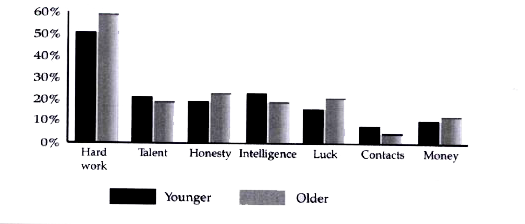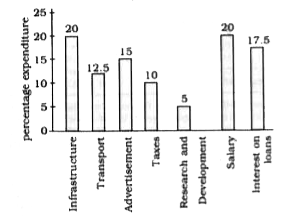The bar graph below shows the comparative study of the most important factors for success between older and younger people. Write a paragraph in about 120 words analysing the infomation and highlighting the different perceptions of success.

Factors For Success
Success is much more than riches, power for fame. It is simply the feeling or satisfaction and happiness one gets from leading a particular way of life or carrying out a particular activity. There are various factors that are important for achieving success. Older people and younger people have different perceptions of success, survey has revealed 20% and 15% of all youth survey hold talent (skills) and intelligence respectively to be important factors determining success, but honesty, luck and money are more important factors for the older generation. However, a nearly equal number 150% -60% in both the categories believes hard work is the single most important factor in achieving success. A very small minority i.e. 10% in both the categories also felt contact to be an important factor in success. Each one of these success factors has been proven to be critical to the achievement of the best life possible for any given person. By systematically implementing one or more of these success factors into your life, you can put your foot on the accelerator of your own career and achieve the best life for yourself whether you be older or younger. If you stick to these factors nothing can stop you from tasting success. Success is a journey which continues even after the goal is achieved.
Similar Questions
The below given pie chart highlights causes of Road Rage. Write an analytical paragraph of about 100-120 words briefly summarising the information.

View SolutionThe bar-graph given below shows the percentage distribution of total expenditures of a company under various expense heads during 2013. Study the graph and answer the given questions.

If the expenditure on advertisement is Rs 2.10 crores, then the difference between the expenditure on transport and taxes is
View Solution
Knowledge Check
PARAGRAPH 1
Study the paragraph and answer the questions that follows:
The most important reason for this state of affairs, perhaps, is that India was the only country in the world to truly recognise the achievements of the Soviet Union-rather than merely focus on the debilitating faults that Communism brought to its people. The people of India realised that the achievement of one hundred per cent literacy in a country much, much larger than its own and with similarly complicated ethnic and religious groupings, the rapid industrialization of a nation that was a primarily agrarian society when the Bolshevik revolution took place in 1917, the attendant revolutionary steps in science and technology, the accessibility of health care (primeval according to Western standards, perhaps, but not according to Indian ones) to the general population, and despite prohibition of the government of the time the vast outpourings in literature, music, art, etc. are momentous and remarkable feats in any country. In contrast, all that the West focused on were the massive human rights violations by the Soviet State on its people, the deliberate uprooting and mass migrations of ethnic peoples from one part of the country to another in the name of industrialization, the end of religion. In short, all the tools of information were employed to condemn the ideology of Communism, so much at variance with capitalist thinking. The difference with the Indian perception, I think here is, that while the Indians reacted as negatively to what the Soviet governments did to its people in the name of good governance (witness the imprisonment of Boris Pasternak and the formation of an international committee to put pressure for his release with Jawaharlal Nehru at its head) , they took the pain not to condemn the people of that broad country in black and white terms, they understood that mingled in the shades of grey were grains of uniqueness (The Russians have never failed that characteristic in themselves, they have twice experimented with completely different ideologies, Communism and Capitalism both in the space of a century) .
1) Which of the following statements according to the passage is correct?AIndia took heed on the weak faults of Russian policies and systemBIndia seriously commended the achievement of Russia, i.e. … cent per cent literacy and rapid industrializationCThe process of industrialization had already started when Russian revolution took place in 1917DThe literature, art and music received a setback during the communist regime in RussiaThe art of effective presentation is the fruit of persistent efforts and practice. Your personality is reflected in your presentation. Adequate planning and preparation are essential for a successful presentation. A thorough preparation is the best antidote for nervousness. If a person is not successful in presenting his views and ideas then it will become the greatest obstacle in his career and life. People form perception about how competent you are by how you present yourself when you stand andspeak.
A successful presentation can help a person in winning orders for the company he works for. Most people who work in organizations find that their effectiveness and success depend of their ability to organize their ideas and present them effectively . Delivering your message in person provides immediate feedback that helps you clarify points and answer questions.
Oral presentations are often more persuasive. As far as possible, one should never read a presentation or memorize it. Then the presentation will lose flexibility and communication will suffer. The spoken word wields great power. Face-to-face interaction demands thinking and speaking. Anecdotes, quotations and humorous touches often make a presentation interesting. One may consult his notes frequently when he is making his presentation. This may create a feeling among listeners that the speaker has taken pains to prepare for the occasion. A positive response will be generated and the speake will be heard with respect to accept to reject an idea in a way that a written document cannot. A presentation should be persuasive and should change the audience attitude. The topic should be of must be interesting to the speaker also otherwise he will go through the motions of making a presentation. No perfunctory approach should ever be resorted to while making a presentation. It is very important that the speaker is perceived by the audience as credible and qualified to speak about the topic. Speaker must adapt to intellectual level of the audience.
Consider the following statements:
1. An effective presentation about the product of a company can help in increasing sales volumes.
2. Impromptu presentation can leave a more forceful impacta on the audience.
Which of the statement(s) given above is/are correct?AOnly 1BOnly 2CBoth 1 and 2DNeither 1 nor 2The art of effective presentation is the fruit of persistent efforts and practice. Your personality is reflected in your presentation. Adequate planning and preparation are essential for a successful presentation. A thorough preparation is the best antidote for nervousness. If a person is not successful in presenting his views and ideas then it will become the greatest obstacle in his career and life. People form perception about how competent you are by how you present yourself when you stand andspeak.
A successful presentation can help a person in winning orders for the company he works for. Most people who work in organizations find that their effectiveness and success depend of their ability to organize their ideas and present them effectively . Delivering your message in person provides immediate feedback that helps you clarify points and answer questions.
Oral presentations are often more persuasive. As far as possible, one should never read a presentation or memorize it. Then the presentation will lose flexibility and communication will suffer. The spoken word wields great power. Face-to-face interaction demands thinking and speaking. Anecdotes, quotations and humorous touches often make a presentation interesting. One may consult his notes frequently when he is making his presentation. This may create a feeling among listeners that the speaker has taken pains to prepare for the occasion. A positive response will be generated and the speake will be heard with respect to accept to reject an idea in a way that a written document cannot. A presentation should be persuasive and should change the audience attitude. The topic should be of must be interesting to the speaker also otherwise he will go through the motions of making a presentation. No perfunctory approach should ever be resorted to while making a presentation. It is very important that the speaker is perceived by the audience as credible and qualified to speak about the topic. Speaker must adapt to intellectual level of the audience.
Consider the following statements:
1. Presentations are not meant to change point of view of the audience about subject of the presentation.
2. Recounting of quotations in the presentation should be avoided as it makes the presentation appear superficial.
Which of the statement(s) given above is/are correct?AOnly 1BOnly 2CBoth 1 and 2DNeither 1 nor 2
The line graph shown below illustrates the main trends in garments of young ladies of 18 to 25 years. Summarise and write an analytic paragraph in your own words highlighting the main features and details. Compare wherever relevant.

View SolutionThe line graph given below shows the number of Fans and Washing Machines produced by Ruby Electricals between 2015 and 2020. Summarise and write an analytic paragraph highlighting the main trends and the necessary details. Compare wherever relevant.

View SolutionThe data given below shows the production of motor bikes in a factory for some months of two consecutive years.

Study the table given above and answer the following questions:
(a) Draw a double bar graph using appropriate scale to depict the above information and compare them.
(b) In which year was the total output the maximum?
(c) Find the mean production for the year 2007.
(d) For which month was the difference between the production for the two years the maximum?
(e) In which month for the year 2008, the production was the maximum?
(l) In which month for the year 2007, the production was the least?
View SolutionStudy the bar graph given below and answer the following questions.

From 2011 to 2016, find the difference between the total number of people who preferred to play Basketball and Badminton (in millions) ?
View SolutionThe students of Class VII have to choose one club from Music, Dance, Yoga, Dramatics, Fine arts and Electronics clubs. The data given below shows the choices made by girls and boys of the class. Study the table and answer the questions that follow:

(a) Draw a double bar graph using appropriate scale to depict the above data.
(b) How many students are there in Class VII?
(c) Which is the most preferred club by boys?
(d) Which is the least preferred club by girls?
(e) For which club the difference between boys and girls is the least?
(f) For which club is the difference between boys and girls the maximum?
View Solution
